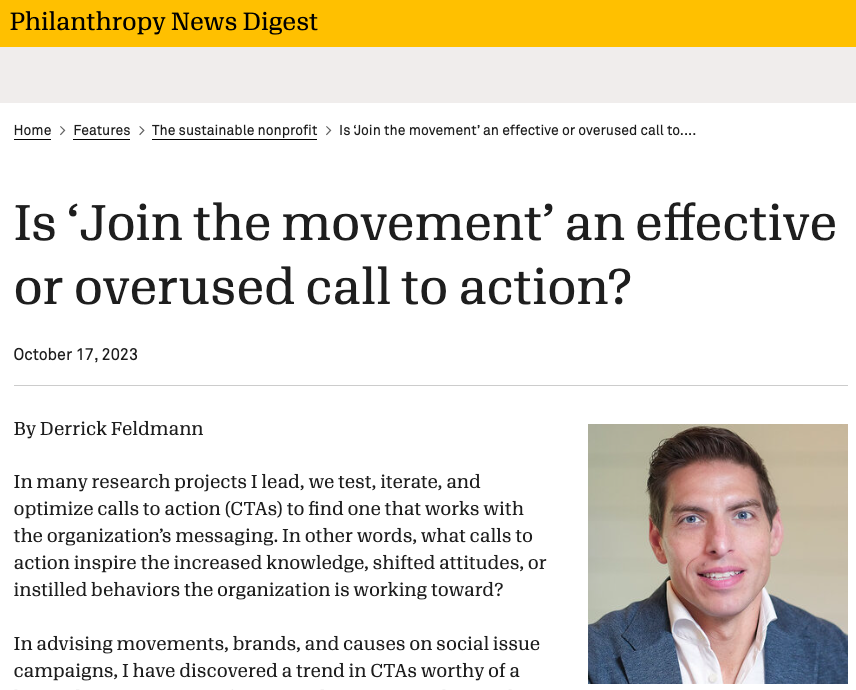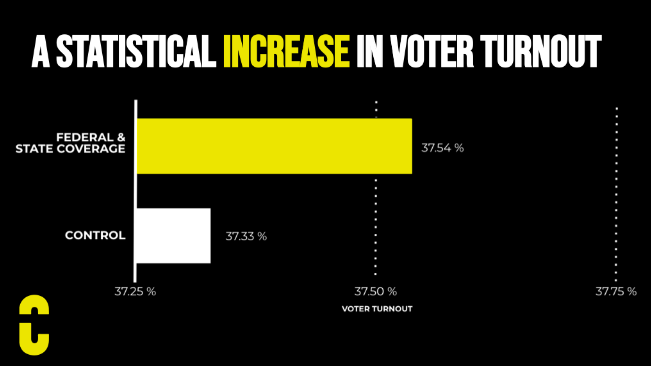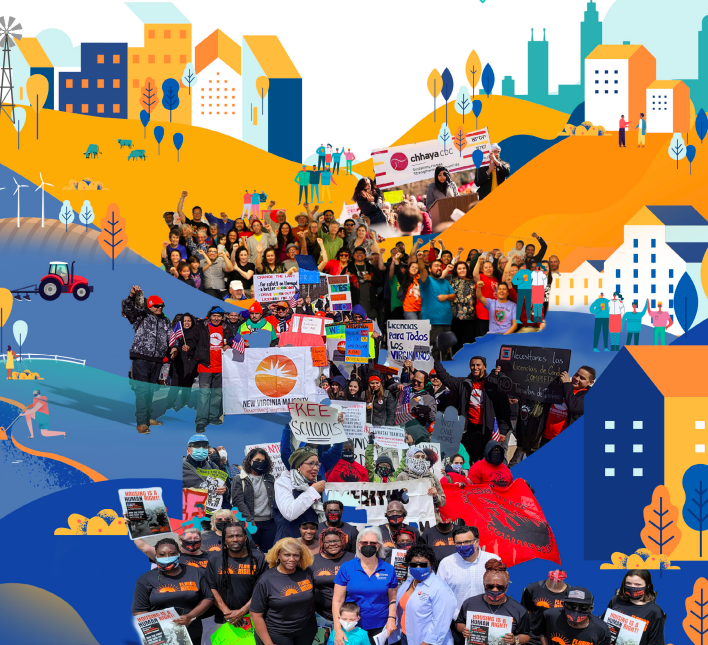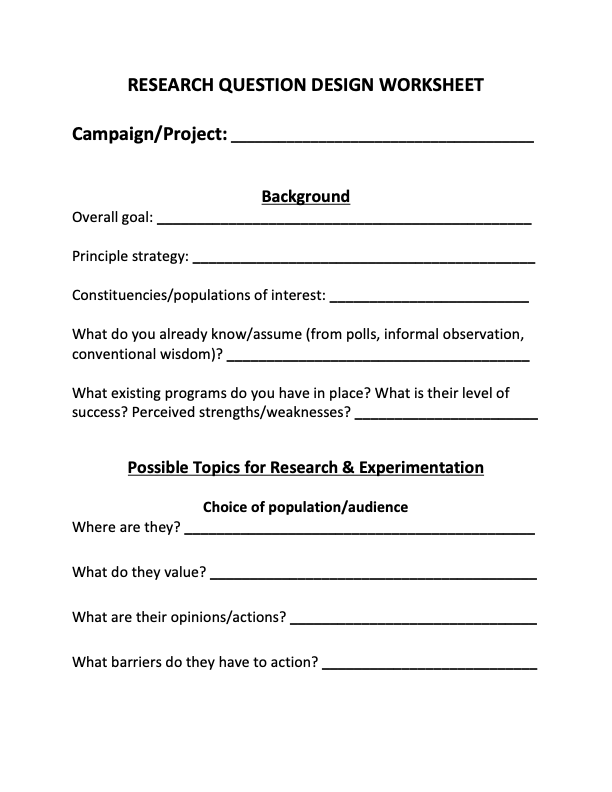Resources
Search below for resources covering the intersection of climate engagement, social science and data analytics.
RESULTS
Transforming the Rural Narrative on Climate Solutions
Join the Rural Climate Partnership for a presentation on how we can use a benefits-forward narrative strategy to connect with rural people. Together, we'll explore 5 narrative keys that allow communicators to reach across cultural differences and avoid culture war frames to connect on shared values.
Is ‘Join the movement’ an effective or overused call to action?
“Join the movement” is a compelling call-to-action (CTA) with people who are already persuaded and more likely to engage anyway. Those who join in response to this CTA tend to already be aligned with the organization’s position and demands, advocating for the social issue and/or participating in a similar movement or organization. “Join the movement” is ineffective with people who aren’t already receptive. Those not already in alignment with, knowledgeable about, or still in the formative stages of deciding where they stand on a social issue are less inclined to engage or see this CTA as motivational (regardless of how “Join the movement” is framed).
Blueprint for a Multiracial, Cross-Class Climate Movement: The Report on Coalitions
Multiracial, cross-class (MRXC) coalition-building is essential if the climate movement is serious about tackling the climate crisis at the scale it demands. However, a historical lack of collaboration, trust, or healthy mechanisms to deal with conflict often impair those efforts. This Blueprint report and accompanying workbook provide an analysis of the difficulties MRXC climate coalitions are likely to face and offer recommendations for a proposed path forward.
Blueprint for a Multiracial, Cross-Class Climate Movement: The Workbook for Coalitions
This workbook is meant to help you translate the analysis and recommendations we provide there into workable features of your organizing. Whether you’re currently involved in a multiracial, cross-class climate coalition, thinking about starting one, or evaluating a past coalition on reflection, we hope this workbook clarifies for you and your coalition partners the breadth of considerations and decisions you should be prepared for.
Climate groups use “climate anxiety” to spur grassroots action
Various climate groups have recently used messages invoking “climate anxiety” to spur grassroots action. Science Moms and Action for the Climate Emergency have joined the Environmental Defense Fund and Climate Emergency Fund in running Facebook and Instagram ads about climate anxiety in recent weeks. A group called RepublicEn has been running Meta ads using conservative messengers like evangelicals, military figures, and elected officials to create a permission structure for Republican voters to support climate action. The dominant narrative about climate change or energy on social media last week concerned a report showing that some of the U.S. Strategic Petroleum Reserve was shipped to countries like China. Pages like Breitbart and Tucker Carlson seized on the news to accuse the Biden administration of “treason”, but their content went mostly unchecked by progressive pages.
Case Study: COURIER’s Model Boosts Voter Turnout
Delivering more political information to voters makes them vote more. COURIER’s unique method of boosting news on social media had a positive, statistically significant impact on voter turnout in the 2021 Virginia state election. There were two kinds of news tested on voters: local coverage of the Virginia 2021 gubernatorial race and candidates and localized coverage of federal policy solutions. These kinds of localized political news increased voter turnout by 0.2%. This experiment was tested on a pool of roughly 1 million Virginia voters on social media from September to November, 2021.
How to Foster Collaborative Relationships
Collaboration is possible with specific kinds of active effort. Too often, potential collaborators focus on the why rather than the how. This resource offers a three-pronged approach for overcoming barriers to interaction. We must (1) raise awareness about what relationality is and why it matters, (2) encourage potential collaborators to explicitly communicate not only WHY they want to connect but also HOW they will relate to others, and (3) we should create and support leaders and institutions that can reduce uncertainty about relationality between potential collaborators. research4impact’s evidence-based matchmaking method, called Research Impact Through Matchmaking (RITM) employs several techniques, including using “role assignment” to communicate each person’s unique task-relevant knowledge, expertise, and lived experience; describing the exchange as a mutually beneficial learning opportunity (to prime a collaborative mindset among all participants); and succinctly restating the goal so that expectations were common knowledge.
Social Homes as Sources of Power for Health Equity
Movement organizations invest in 4 common elements to support individual and collective member political transformation and enhance recruitment and retention. These methods include: addressing whole-person needs via culture, community-building, and care; internal accountability and decision-making; political education; and enabling smaller “sub-homes” within the home (i.e., within the organization). Organizations believe they can successfully convert the collective member transformation occurring within their social homes into potential and exercised power over the conditions and policies that create health inequities. Movement organizations are hungry for spaces where they can be in direct dialogue with one another regarding the operationalization and measurement of this work. This report includes case studies on various organizations around the US—on how they’ve aimed to cultivate “social homes” within their constituencies.
Environmental Polling Roundup - September 24th, 2021
This post includes a roundup of climate + environment headlines from this week’s public polls, good data points to highlight, and a full roundup with key takeaways from each poll - including lots of timely new polling on the Build Back Better plan.
HEADLINES
- Yahoo + YouGov - Americans support Biden’s “$3.5 trillion infrastructure plan” by double digits, and a plurality support using the budget reconciliation process to overcome a Republican filibuster (Topline, Crosstabs)
- POLITICO + Morning Consult - Voters widely support tax breaks for renewable energy in the reconciliation bill, even when it’s framed as a Democratic proposal (Topline, Crosstabs)
- Data for Progress + Invest in America - Voters support the Build Back Better plan by a two-to-one margin after reading an explanation of its components; grid modernization continues to be one of the plan’s most popular provisions (Release, Topline)
- LCV + Climate Power - Majorities of voters across Democratic-held U.S. Senate battleground states (AZ, CO, GA, NH + NV) support the Build Back Better plan after a brief description, and majorities also reject the idea of trimming the bill down; top messages focus on jobs, pollution/health, and lowering utility bills (Deck, Memo, AZ Topline, CO Topline, GA Topline, NH Topline, NV Topline)
- Navigator - Climate is rising as a national priority; two in five voters say that weather in their community this summer has been different from past years, and most who have experienced unusual weather cite climate change as the reason (Release, Deck, Topline)
- Data for Progress - “Green jobs” are a confusing concept for voters (Memo)
- Yale Program on Climate Change Communication - Moderates have similar reactions to “climate change” and “extreme weather” as the rationale for emergency preparedness actions and policies, but there are benefits to using “extreme weather” with conservative audiences (Article)
Research question development worksheet
Prompts to help you think through developing a research project, from big-picture strategy to the specifics of a hypothesis.
Pagination
- Page 1
- Next page





